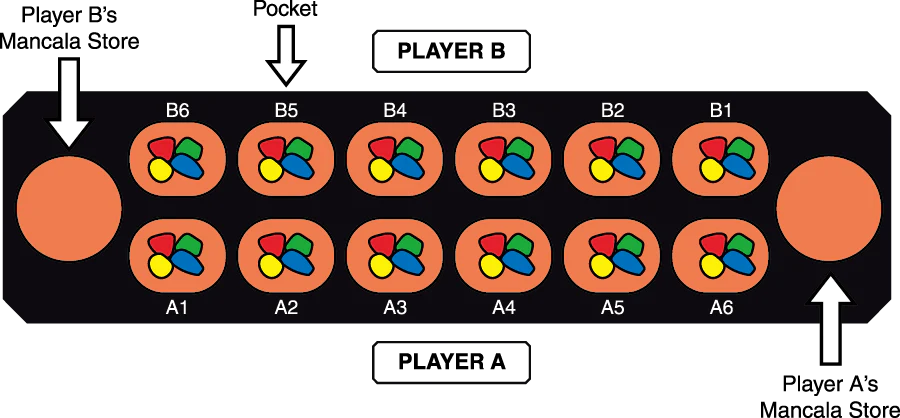Mancala
Overview
Mancala stems from the Arabic word meaning "to move". The origins of this count and capture game is unknown. According to the Savannah African Art Museum there is evidence of the game being played as early as 700 CE in East Africa. There are also examples of the game from ancient Egypt dating around 1400 B.C.E, in which the game was carved in the temple roofs of in Memphis, Tebes and Luxor. However, the oldest Mancala board to be discovered was dated to 6000 B.C.E. in Jordan, leading to many archaeologist to consider Mancala among the oldest games in the world.
Players
2 player
Resources
- Mancala board
- 48 stones
Goal
Obtain more stones than your opponent.
Setup
Place the game board between the players lengthwise. Each player controls a rows of 6 small holes called "pockets" and one larger hole called "store" that is on the right of the player.
Begin by placing 4 stones in each of the "pocket" (a total of 12) on the board.
One player is selected to go first.

Game Mechanics
- For each turn, the player picks up all the stones in any one of their "pockets".
- Then the player will place one stone into an adjacent "pocket" moving in a counter-clockwise direction.
- If there are enough stones, the player will continue to place a stone in their "store" and in each of their opponents "pockets" until they have run out of stones.
- If the player has placed a stone in the "store", they will receive an extra turn and can select another pocket to move from.
- If a stone is placed in an empty pocket belonging to the player, then they capture the stones from the opponent's hole on the other side.
- The captured stones and the player's one stone are all placed in the "store".
- The gameplay repeats, each player taking a turn moving stones.
Outcomes
The game ends when a player has no remaining stones in their "pockets". Each player will count the number of stones in their "store", the player with the most stones wins.